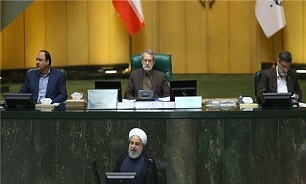Iran’s Annual Budget Planned against Sanctions
 “Our budget for the next year, like the current year, will be based on resistance against sanctions; the budget’s message is that we will manage the country despite all sanctions,” President Hassan Rouhani said this morning in the open session of the Parliament in Tehran.
“Our budget for the next year, like the current year, will be based on resistance against sanctions; the budget’s message is that we will manage the country despite all sanctions,” President Hassan Rouhani said this morning in the open session of the Parliament in Tehran.
“Next year’s budget is not much reliant on oil. Anticipated revenues for oil and gas sales are close to the required budget for civil projects,” he said, adding that 700 trillion rials (some $5.3 billion) have been allocated to such projects.
Rouhani was at the Parliament to submit the next year’s budget bill.
“We were under the toughest sanctions last year; we promised that the administration, with the support of the resistant Iranian nation and other organizations, would make every effort to provide and implement the budget and this has been realized by now,” Rouhani said.
Nine months have passed since the start of the local calendar year of 1398 and all the daily budgets have been provided, he said, adding that 340 trillion rials (some $2.6 billion) have been allocated to civil projects. “Major projects have either been inaugurated or will be by the year-end.”
“All this has been realized while Americans and Zionists thought that sanctions would cripple the government, but they gave up on that and will keep being disappointed in the future,” Rouhani said.
In October, Governor of the Central bank of Iran (CBI) Abdolnasser Hemmati announced that the country has further reduced its reliance on oil revenues to bring the share of the income earned though crude sales in the budget to less than 30 percent.
“Oil has had the major share of production and exports in Iran’s economy for 50 years, but today less than one-third of the exports is related to oil,” Hemmati wrote on his Instagram.
He reiterated that Iran’s economic growth had been greatly affected by the oil sector, but now the situation has changed.
“The CBI will be able to create stability in non-oil sector by adopting monetary and currency policies,” the CBI governor added.
In August, Iranian Vice-President and Head of the Management and Planning Organization Mohammad Baqer Nobakht said that his country is determined to draft its new budget bill with zero-dependence on oil revenues in a bid to disappoint the US with its maximum pressure campaign against Tehran.
Following the US’ unilateral withdrawal from the Iran nuclear deal last year, US President Donald Trump's administration went ahead with re-imposing sanction on Iran, targeting the country’s energy and banking sectors, and stepping up efforts to drive Iran’s oil revenues to zero.
In April, the White House announced its decision not to renew waivers that allow eight countries, including China, Greece, India, Italy, Japan, South Korea, Taiwan and Turkey, to buy Iranian oil without facing US sanctions.
Meanwhile, Iran says with or without waivers, the country’s oil exports will not fall to zero under any circumstances. At the same time, the country is making efforts to reduce its reliance on oil revenues and instead turn its focus on non-oil production and exports.
Back in July, Iranian Parliament Speaker Ali Larijani underlined the US failure to cut to zero his country's oil exports, saying that Washington has been defeated by Iran's smart moves.
Message end/
